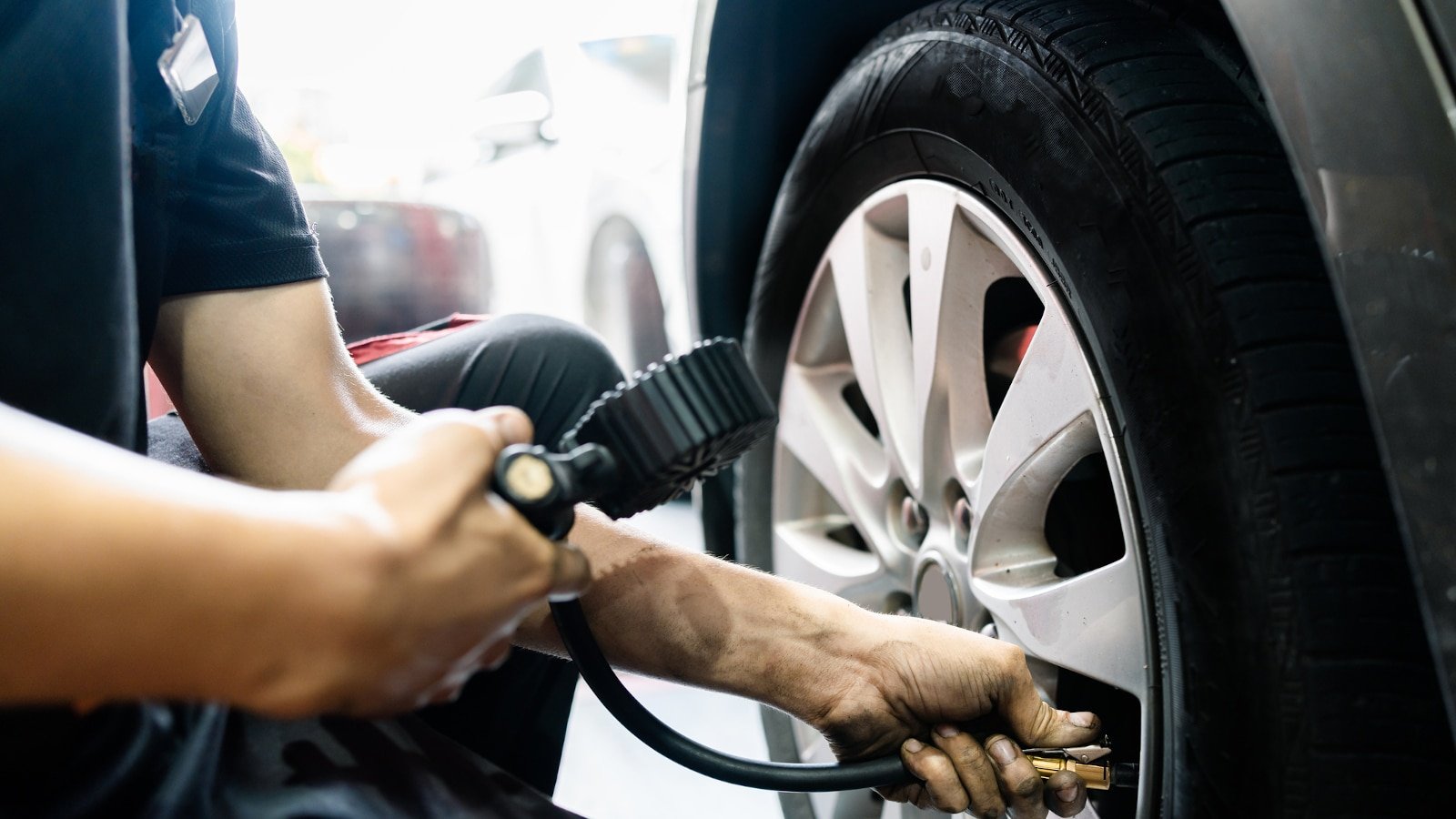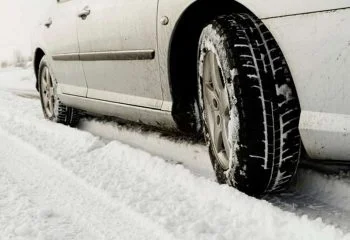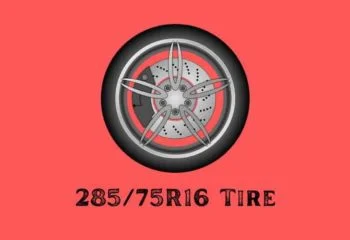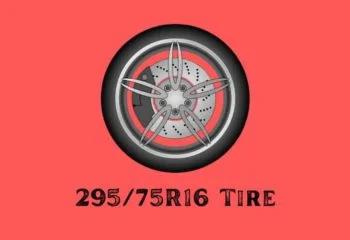When it comes to your car, there are a few key things you should always keep in good condition. One of those is the tires.You may have heard of people having a “blow out” on the highway. You may have even experienced one yourself.
It’s an unnerving experience, to say the least, and it can be dangerous, too. But do you know what causes them and why they’re so serious? Unfortunately, many people don’t even think about their tires until they start having problems. One such problem is an over inflated tire.
An over inflated tire can lead to a number of issues for your car, so it’s important to be able to identify the symptoms.
This post will discuss what are some over inflated tires symptoms, what causes it, and how it’s bad for your car. We’ll also provide tips for how to prevent this from happening in the first place. Stay safe out there!
What's in this post?
What is an overinflated tire?
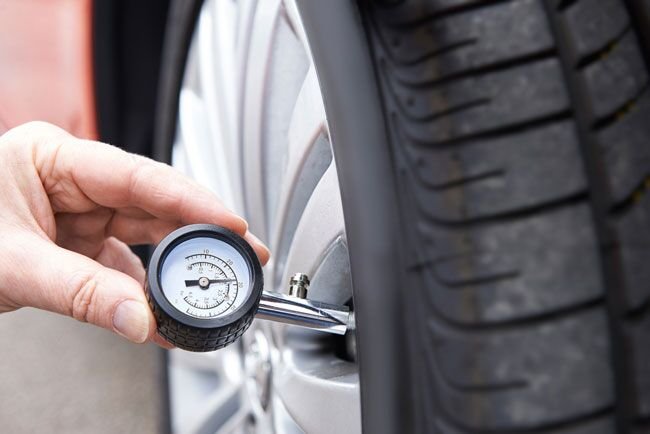
An overinflated tire is a tire that has been inflated to a pressure that is above the maximum recommended level. This can cause the tire to wear out too quickly, or even burst.
Overinflated tires can also make the car harder to handle. For these reasons, it’s important to check your tires regularly to make sure they’re not overinflated.
If you do find an overinflated tire, you can let some of the air out until it reaches the proper pressure. Consult your owner’s manual or a tire specialist to find out what the proper pressure should be.
What is tire pressure?
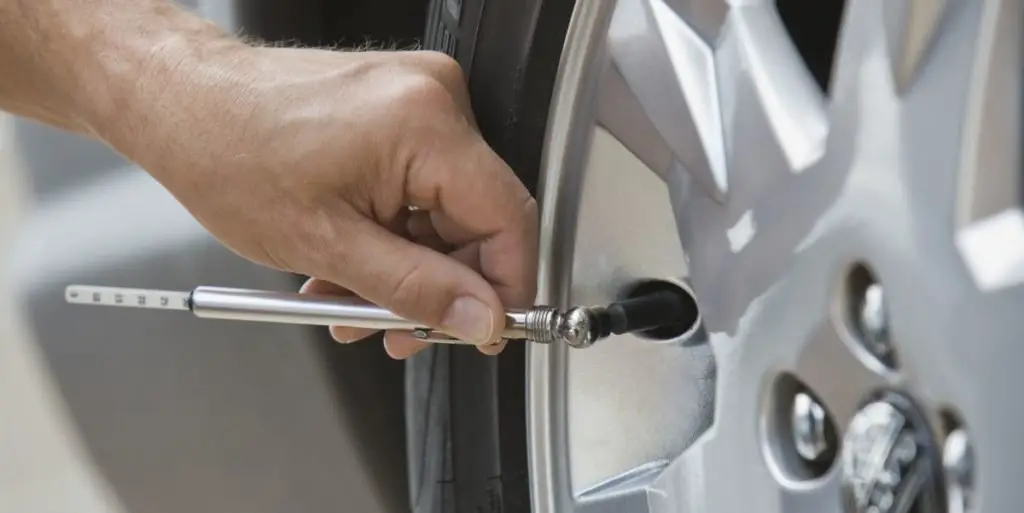
Tire pressure refers to the amount of air that is in each tire on a vehicle. It is measured in pounds per square inch (psi) or bar.
The recommended tire pressure for most passenger cars is 30 psi or 2.0 bar. The purpose of maintaining the correct tire pressure is to keep the tires from rolling over on themselves, which can cause a blowout.
It also helps the tires last longer and grip the road better, which provides a safer ride. For these reasons, it is important to check your tire pressure regularly and inflate or deflate the tires as needed to maintain the correct pressure.
What are the over inflated tires symptoms?
There are several symptoms that can indicate an overinflated tire. These include:
A bumpy ride
If you feel every little bump and crack in the road, that’s a sign that your tires are overinflated. The reason for this is that the tire will not be able to conform to the road surface as well, causing it to bounce more.
If you’re not used to the feeling, it can be quite jarring and make for a very uncomfortable ride.
Worn out tread
Another symptom of an overinflated tire is premature tread wear. This is because the tire will have less contact with the ground, which means that the middle of the tire will bear most of the weight.
This can cause the tread in the middle of the tire to wear down much faster than the rest of the tire.
You may also notice that the sides of your tires are wearing down more than usual. This is because they are not getting as much contact with the road either.
Diminished traction
A tire that is overinflated will have less contact with the ground, which in turn will lead to diminished traction.
This can be extremely dangerous in slippery or icy conditions, as the tires will be less able to grip the road and maintain control of the vehicle.
It can also cause the tires to lose traction while braking, which could lead to an accident.
Poor fuel economy
Overinflated tires not only give a rougher ride, they also can cause decreased fuel economy. When a tire is overinflated, it causes the tire to be less pliable.
This makes the tire unable to conform to the road surface, which leads to an increase in rolling resistance. Rolling resistance is the force required to keep a tire rolling, and it increases fuel consumption.
What causes overinflated tires
Over inflated tires can be caused by a number of things, including:
Incorrect tire pressure
One of the most common causes of over inflated tires is simply putting too much air in the tires. This can happen if you don’t know the proper tire pressure for your vehicle, or if you misread the gauge when inflating the tires.
It’s important to check your owner’s manual or ask a tire specialist to find out what the correct tire pressure should be for your vehicle.
Worn out suspension components
When the shocks or struts start to wear out, they can’t dampen the bouncing of the vehicle as well, causing the tire to come off the ground more.
The higher the tire is off the ground, the more air it has in it and the more pressure there is on the sidewall. Over time, this can cause the sidewall to rupture and blow out.
In addition, worn suspension components can also cause misalignment. This misalignment puts extra stress on the tires, which can also lead to a blowout.
To prevent this from happening, it’s important to have your suspension checked regularly and replaced when necessary. By keeping your suspension in good condition, you can help avoid tire problems down the road.
Useful read: Who Makes Mastercraft Tires? Are They Good?
The consequences of having an over inflated tire
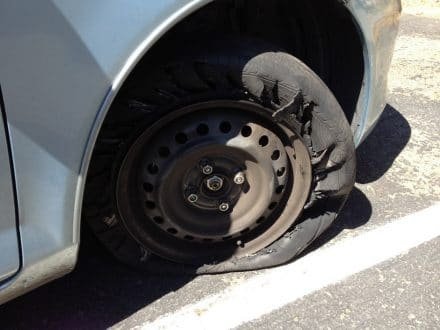
Tire blow out
One of the most serious consequences of having an over inflated tire is a blow out. When a tire blows out, it can cause the vehicle to lose control and possibly lead to an accident.
A blow out can be caused by a number of things, including incorrect tire pressure, worn out suspension components, and misalignment.
To avoid a blow out, it’s important to check your tire pressure regularly and inflate or deflate the tires as needed to maintain the correct pressure. You should also have your suspension checked regularly and replaced when necessary.
Useful read: Can I Drive 200 Miles On A Donut Tire?
Wearing out quicker
Another consequence of over inflating your tires is that they will wear out much quicker than normal. This is because the tire will have less contact with the ground, which causes the tread in the middle of the tire to wear down much faster than the rest of the tire.
You may also notice that the sides of your tires are wearing down more than usual. This is because they are not getting as much contact with the road either.
To avoid this, it’s important to check your tire pressure regularly and keep the tires inflated to the proper level. By doing this, you can help extend the life of your tires and avoid having to replace them prematurely.
Front suspension damage
Another issue that can be caused by over inflating your tires is damage to the front suspension. When a tire is over inflated, it causes the tire to be less pliable. This makes the tire unable to conform to the road surface, which leads to an increase in rolling resistance.
The extra rolling resistance puts a strain on the front suspension, which can cause the components to wear out prematurely. In addition, it can also cause misalignment, which puts even more stress on the front suspension.
To avoid this, it’s important to check your tire pressure regularly and inflate or deflate the tires as needed. You should also have your suspension checked regularly and replaced when necessary.
Reduced braking ability
Another problem that can be caused by over inflated tires is reduced braking ability. When a tire is over inflated, it doesn’t have as much contact with the road. This means that there is less friction between the tire and the road, which reduces the tire’s ability to stop the vehicle.
In addition, over inflated tires can also cause the brakes to fade. This is because the extra rolling resistance causes the brake pads to heat up, which leads to brake fade.
To avoid this, it’s important to check your tire pressure regularly and inflate or deflate the tires as needed. You should also have your brakes checked regularly and replaced when necessary.
Increased fuel consumption
Finally, another consequence of over inflating your tires is increased fuel consumption.
When a tire is over inflated, it causes the vehicle to have to work harder to move forward. This extra effort leads to increased fuel consumption.
How to release air from tire/deflate a tire
Deflate a tire is a relatively simple process that can be done with just a few tools.
- First, locate the valve stem on the tire. This is the small metal tube sticking out of the side of the tire.
- Next, use a tire valve wrench or another small tool to unscrew the cap from the valve stem.
- Once the cap is off, press down on the valve to release air from the tire. To let out a large amount of air quickly, you can also use a tire inflator or compressor.
- Simply attach the inflator to the valve stem and turn it on. When you have released enough air from the tire, screw the cap back onto the valve stem to prevent any further air loss.
How to prevent tire over inflated
To prevent your tires from becoming over inflated, it’s important to check the pressure regularly and inflate or deflate the tires as needed. Recommended tire pressure can be found in the owner’s manual or on a sticker inside the driver’s door.
In addition, it’s also a good idea to invest in a tire pressure gauge so that you can accurately check the pressure of your tires.
You should also have your suspension checked regularly and replaced when necessary.
In addition, you should avoid driving on rough roads or in potholes whenever possible. This can help reduce the risk of damaging your tires or suspension.
If you do hit a pothole or run over a curb, it’s important to inspect your tires for any signs of damage. If you notice any bulges, cracks, or cuts in the sidewall of the tire, you should have the tire inspected by a professional as soon as possible.
FAQs
Is 40 psi too high for tires?
The ideal tire pressure for most cars is between 30 and 35 psi. Anything above that can put unnecessary strain on the tires and may cause them to wear out more quickly.
That said, 40 psi is not necessarily too high for tires; it all depends on the car. Some models require higher tire pressure, so it’s important to check the owner’s manual before inflating the tires.
In general, however, it’s best to err on the side of caution and keep the pressure at or below the recommended level.
Overinflated tires are more likely to burst, and they offer less traction and stability than properly inflated tires. So while 40 psi may be fine for some cars, it’s best to play it safe and stick to the lower end of the range.
At what PSI will a tire explode?
Tires are designed to withstand a certain amount of pressure before they explode. This threshold is typically around 200 PSI, though it can vary depending on the type of tire.
For instance, racing tires are designed to withstand higher levels of pressure and may not explode until they reach 250 PSI or more.
On the other hand, passenger tires are not made to withstand as much pressure and may explode at lower levels, such as 180 PSI.
In general, it is safe to say that most tires will explode when they reach 200 PSI. However, it is always best to check the pressure rating of your tires before inflating them to make sure you do not exceed the maximum level.
Is it okay to over inflate tires by 2 psi?
There is no harm in inflating your tires to 1 or 2 psi above the recommended level. In fact, doing so can help you avoid problems such as under inflation, which can lead to premature tire wear.
However, if you consistently over inflate your tires, you may eventually cause damage to the tire treads or sidewalls.
Additionally, over inflation can make your car less stable and increase the risk of a blowout. Ultimately, it is best to stick to the recommended tire pressure levels to ensure optimal performance and safety.
Is it better to over inflate or Underinflate tires?
Always better to go over than under. That is not to say you should over inflate as that can cause premature wear also, but it is better than having an under inflated tire.
An under inflated tire will heat up faster and can cause a blow out. An over inflated tire will give a harsher ride but is less likely to have the same consequences as an underinflated one.
Why do dealers overinflate tires?
When a car dealer overinflates tires, it is usually done to help prevent the flat spot from forming in the tire during the shipping process.
Flat spots can form when a tire sits in one spot for too long and the weight of the vehicle presses down on that spot.
Overinflating the tires can help to reduce the amount of contact between the tire and the ground, which will in turn help to prevent flat spots from forming.
Can a tire exploded while inflating?
While it is possible for a tire to explode while inflating, it is not very likely. The vast majority of tire explosions occur when the tire is already on the vehicle and under stress, such as when driving at high speeds. The chances of a tire exploding while inflating are much lower, but it can still happen.
Can over-inflated tires cause wobble?
Over-inflated tires can cause a wobble in your car, especially at high speeds.
Wobble is a condition in which the tire begins to oscillate from side to side, causing the vehicle to shake or vibrate. This can be a very dangerous condition, as it can make it difficult to control the vehicle.
It is because the extra pressure in the tires makes them less able to absorb bumps in the road. The result is a rougher ride and more wear and tear on your tires.
Should all 4 tires have the same PSI?
It is generally recommended that all four tires on a vehicle have the same PSI, or pounds per square inch. This helps to ensure even contact with the road, which can lead to improved handling and braking.
Uneven tire pressure can also cause premature wear, as well as decreased fuel efficiency.
In addition, having the same PSI in all four tires can help to prolong their overall lifespan. However, there may be some exceptions to this rule.
For example, if a vehicle is frequently driven in off-road conditions, it may be beneficial to have slightly higher pressure in the front tires to improve traction.
Ultimately, it is important to consult with a professional to determine the best tire pressure for your specific vehicle and driving needs.
Can over inflated tires cause noise?
There is a common belief that over inflated tires can cause noise, but there is no scientific evidence to support this claim.
In fact, it is just as likely that under inflated tires are the source of tire noise. The reason for this is that when a tire is under inflated, the sidewalls flex more as the tire rolls.
This flexing can create friction between the tread and the road, which can cause noise. Similarly, improper alignment or balance can also cause tire noise. (Here is how to tell if which tire is out of balance)
If you are concerned about tire noise, the best solution is to have your tires professionally inspected to ensure they are properly inflated and in good condition.
Should you overinflate tires in winter?
One of the most common questions we get here at the shop is whether or not it’s okay to overinflate tires in winter. And while overinflating a tire is never really a good idea, it’s especially dangerous during the winter months.
That’s because when the temperatures drop, tire pressure drops as well. So if you add too much air to your tires in anticipation of the colder weather, you could end up with a blowout.
In addition, overinflated tires are more likely to lose traction on icy roads, which could lead to an accident.
So while it might seem like inflating your tires a bit extra will give you a smoother ride, it’s actually much safer to stick to the manufacturer’s recommendations.
Conclusion
A car’s tires are an important part of the overall function and safety of the vehicle. Driving on over inflated tires can lead to a number of problems for your car, including decreased fuel efficiency, increased wear on brakes and other components, and even accidents.
Now that you know the over inflated tires symptoms, it’s important to be able to identify them. If you’re ever in doubt, take your car into a mechanic and have them check your tires. Not only will this keep you safe on the road, but it can also save you money in the long run by preventing damage to your car. Have you ever had a problem with over inflation? Leave us a comment and tell us about it!
It is important to check your tire pressure regularly and ensure that they are properly inflated according to the manufacturer’s recommendations.

